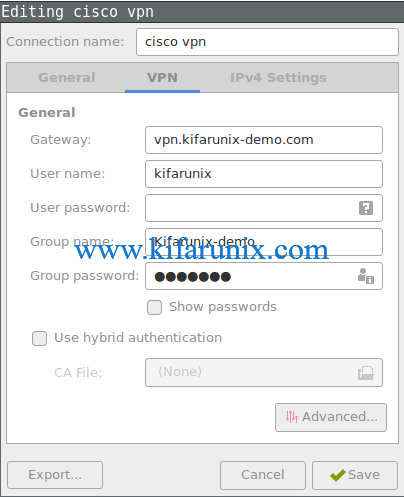You may make the Cisco Anyconnect icon appear on the Unity icon launcher by right clicking on the icon just after launching the Anyconnect client and selecting 'Lock to Launcher.' Linux (Fedora 32 or 64bit) Anyconnect Installation Guide Browse to NS VPN Client Download Page Download the correct 'anyconnect-predeploy-linux' file (32 or 64 bit). You may make the Cisco Anyconnect icon appear on the Unity icon launcher by right clicking on the icon just after launching the Anyconnect client and selecting 'Lock to Launcher.' Linux (Fedora 32 or 64bit) Anyconnect Installation Guide Browse to NS VPN Client Download Page Download the correct 'anyconnect-predeploy-linux' file (32 or 64 bit). Complete Cisco AnyConnect Secure Mobility Client for Windows, Mac OS X 'Intel' and Linux (x86 & x64) platforms for Cisco IOS Routers & ASA Firewall Appliances. Release Date: 1st April 2013 Version: 3.1.03103.
OpenConnect is a cross-platform multi-protocol SSL VPN client which supports a number of VPN protocols:
- Cisco AnyConnect (--protocol=anyconnect)
- Juniper SSL VPN (--protocol=nc)
- Pulse Connect Secure (--protocol=pulse
- Palo Alto Networks GlobalProtect SSL VPN (--protocol=gp)
- F5 Big-IP SSL VPN (--protocol=f5)
- Fortinet Fortigate SSL VPN (--protocol=fortinet)
Fedora Cisco Anyconnect Client
OpenConnect is not officially supported by, or associated in any waywith Cisco Systems, Juniper Networks, Pulse Secure, Palo Alto Networks, F5,or Fortinet, or any of the companies whose protocols we may support in the future.It just happens to interoperate with their equipment. Trademarks belong totheir owners in a rather tautological and obvious fashion.
An openconnect VPN server (ocserv), which implementsan improved version of the Cisco AnyConnect protocol, has also beenwritten.

OpenConnect is released under the GNU Lesser Public License, version 2.1.
Motivation
Cisco Anyconnect Fedora 33

Development of OpenConnect was started after a trial of the Cisco AnyConnectclient under Linux found it to have many deficiencies:
- Inability to use SSL certificates from a TPM or PKCS#11 smartcard, or even use a passphrase.
- Lack of support for Linux platforms other than i386.
- Lack of integration with NetworkManager on the Linux desktop.
- Lack of proper (RPM/DEB) packaging for Linux distributions.
- 'Stealth' use of libraries with dlopen(), even using the development-only symlinks such as libz.so — making it hard to properly discover the dependencies which proper packaging would have expressed
- Tempfile races allowing unprivileged users to trick it into overwriting arbitrary files, as root.
- Unable to run as an unprivileged user, which would have reduced the severity of the above bug.
- Inability to audit the source code for further such 'Security 101' bugs.
Naturally, OpenConnect addresses all of the above issues, and more.
New protocols

Adding new protocols to OpenConnect is relatively simple, andadditional protocols have been added over the years since usingOpenConnect allows a developer to concentrate on the protocol itselfand most of the boring details about platform-specific tunnel managementand IP configuration, and handling of client SSL certificates, are alreadyresolved.
If you have a protocol which you think it makes sense to support inOpenConnect, especially if you are able to help with interoperabilitytesting, please file an issuein GitLab.
Consistent multi-protocol support
Wherever possible, OpenConnect presents a uniform API and command-lineinterface to each of these VPNs. For example,openconnect --force-dpd=10will attempt dead peer detection every 10 seconds on every VPN thatsupports it, even though the actual mechanism used may be protocol-specific.Protocol-specific features and deficiencies are described on theindividual protocol pages.
